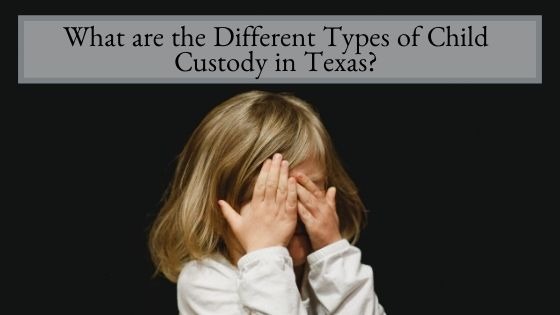The question of “Who gets custody of the kids?” is one of the most difficult decisions for parents and their children, when parents separate. Custody and visitation are the legal terms for court decisions about how the child will spend his/her time between parents. In Texas, the law does not favor either the mother or father. The law looks at the relationship of each parent with the child. While grandparents and others may seek custody, there is a “presumption” in favor of the natural parents. This means that the court is more likely to favor the natural parents. If you are a parent and going through a divorce it is very important that your divorce attorney is experienced with child custody and handling that aspect of your divorce.
Here are the different types of Texas child custody:
- Sole Custody – Custody is made up of: legal custody and physical custody. A person with legal custody has the right to make long range plans and decisions for education, religious training, discipline, non-emergency medical care and other matters of major significance concerning the child’s welfare. A person with physical custody has the child living primarily with them and they have the right to make decisions as to the child’s everyday needs. Sole Custody is when both legal and physical custody are given to one parent. The child has only one primary residence.
- Joint Custody – Joint custody is actually broken down into three categories: Joint Legal, Shared Physical, and Combination.
Joint Legal custody is where the parents share care and control of the upbringing of the child, but the child has only one primary residence.
In shared physical custody the child has two residences, spending at least 35% of their time with the other parent.
You can make your own special joint custody agreement that is any combination of Shared Physical and Joint Legal Custody. One example of this is when there is one residence for the child and the parents live with the child there on a rotating basis.
The court looks very closely at Joint Custody agreements. If you are constantly fighting over what religion or what school, the court may strike down your agreement. Additionally, the sincerity of the parties involved is important. The court will want to make sure that joint custody isn’t being traded for concessions on other points. Another consideration is whether the grant of joint custody will affect any assistance programs. - Temporary Custody – Temporary custody refers to who actually has custody of the child at this time. This can be different from “court ordered custody”. In order to formalize custody before you begin litigation, you will need to file for temporary custody. Temporary custody will be based on the “best interests” of the child standard. It is not an “initial” award of custody. Instead it is temporary custody while you wait for the court to hold a hearing.
- Split Custody – Split custody is easiest to describe in a situation where there are two children and each parent obtains full physical custody over one child. Some of the considerations that may bring about this result are age of the children and child preference.
What are Some of the Factors that the Court Looks at for Custody?
The court will look to see if the parties involved really want custody or are they just using it to hurt the other parent, by using it as a way to control them. Some of the factors that courts will use to determine custody are the following:
- willingness of parents to share custody;
- fitness;
- child’s relationships with parents;
- child’s preference;
- ability to stabilize child’s school and social life;
- closeness to parent’s homes (primarily a factor during the school year) ;
- employment considerations (e.g. long hours, extensive travel, etc.);
- age and number of children;
- financial status;
- benefit to the parent(s).
An experienced divorce attorney will be able to help you in navigating the turbulent waters of divorce and child custody. If you need the assistance of an experienced child custody attorney contact any of our office locations.
Arlington (817) 522-4451
Dallas (972) 362-6848
Fort Worth (817) 764-1375
Plano (972) 354-4602
Cedar Hill (972) 338-9427
McKinney (469) 522-3688
Lewisville (972) 354-4605
Frisco (972) 725-7681
Grapevine (817) 835-8677
Irving (972) 354-4610
Keller (817) 204-0904
Garland (214) 572-2251
Denton (940) 222-4060
Addison (972) 564-8108
You can also contact us online by using our quick contact form.











